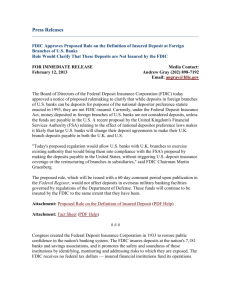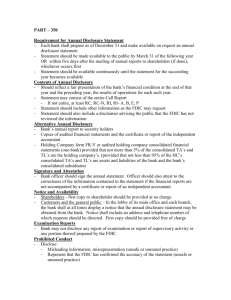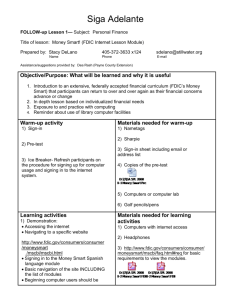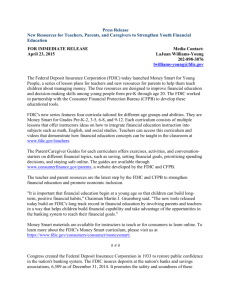The Safety Net of FDIC Insurance - Tri
advertisement
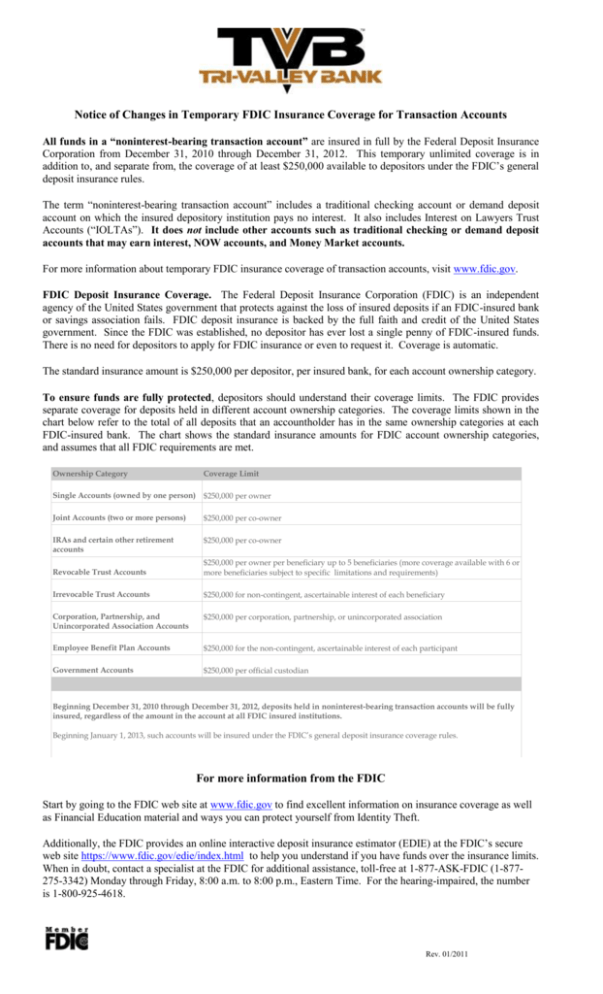
Notice of Changes in Temporary FDIC Insurance Coverage for Transaction Accounts All funds in a “noninterest-bearing transaction account” are insured in full by the Federal Deposit Insurance Corporation from December 31, 2010 through December 31, 2012. This temporary unlimited coverage is in addition to, and separate from, the coverage of at least $250,000 available to depositors under the FDIC’s general deposit insurance rules. The term “noninterest-bearing transaction account” includes a traditional checking account or demand deposit account on which the insured depository institution pays no interest. It also includes Interest on Lawyers Trust Accounts (“IOLTAs”). It does not include other accounts such as traditional checking or demand deposit accounts that may earn interest, NOW accounts, and Money Market accounts. For more information about temporary FDIC insurance coverage of transaction accounts, visit www.fdic.gov. FDIC Deposit Insurance Coverage. The Federal Deposit Insurance Corporation (FDIC) is an independent agency of the United States government that protects against the loss of insured deposits if an FDIC-insured bank or savings association fails. FDIC deposit insurance is backed by the full faith and credit of the United States government. Since the FDIC was established, no depositor has ever lost a single penny of FDIC-insured funds. There is no need for depositors to apply for FDIC insurance or even to request it. Coverage is automatic. The standard insurance amount is $250,000 per depositor, per insured bank, for each account ownership category. To ensure funds are fully protected, depositors should understand their coverage limits. The FDIC provides separate coverage for deposits held in different account ownership categories. The coverage limits shown in the chart below refer to the total of all deposits that an accountholder has in the same ownership categories at each FDIC-insured bank. The chart shows the standard insurance amounts for FDIC account ownership categories, and assumes that all FDIC requirements are met. Ownership Category Coverage Limit Single Accounts (owned by one person) $250,000 per owner Joint Accounts (two or more persons) $250,000 per co-owner IRAs and certain other retirement accounts $250,000 per co-owner Revocable Trust Accounts $250,000 per owner per beneficiary up to 5 beneficiaries (more coverage available with 6 or more beneficiaries subject to specific limitations and requirements) Irrevocable Trust Accounts $250,000 for non-contingent, ascertainable interest of each beneficiary Corporation, Partnership, and Unincorporated Association Accounts $250,000 per corporation, partnership, or unincorporated association Employee Benefit Plan Accounts $250,000 for the non-contingent, ascertainable interest of each participant Government Accounts $250,000 per official custodian Beginning December 31, 2010 through December 31, 2012, deposits held in noninterest-bearing transaction accounts will be fully insured, regardless of the amount in the account at all FDIC insured institutions. Beginning January 1, 2013, such accounts will be insured under the FDIC’s general deposit insurance coverage rules. For more information from the FDIC Start by going to the FDIC web site at www.fdic.gov to find excellent information on insurance coverage as well as Financial Education material and ways you can protect yourself from Identity Theft. Additionally, the FDIC provides an online interactive deposit insurance estimator (EDIE) at the FDIC’s secure web site https://www.fdic.gov/edie/index.html to help you understand if you have funds over the insurance limits. When in doubt, contact a specialist at the FDIC for additional assistance, toll-free at 1-877-ASK-FDIC (1-877275-3342) Monday through Friday, 8:00 a.m. to 8:00 p.m., Eastern Time. For the hearing-impaired, the number is 1-800-925-4618. Rev. 01/2011
